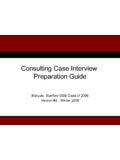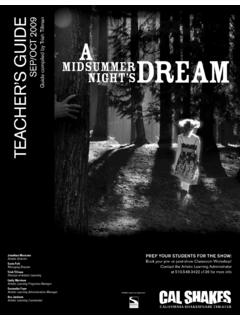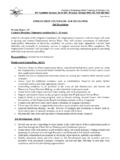Transcription of PREPARING FOR A CAREER AS A PUBLIC SAFETY …
1 PREPARING FOR A CAREER AS A PUBLIC SAFETY dispatcher PREPARING for a job interview with a PUBLIC SAFETY agency rarely lasts longer than an hour, but its consequences can last for many years. In order for the interview panel to identify you as a well-qualified candidate, it is important for you to prepare in advance for the interview . THE MOST IMPORTANT THING YOU CAN DO IS PLAN AHEAD Before you ever apply at an agency, make sure it is an agency you want to work for. Research both the agency and the position you are applying for. Complete your resume and/or job application written to the specifications listed on the application.
2 Follow the directions on or with your application. If you cannot follow directions, your application may be rejected. Find a way to learn more about the agency you want to work for. This may include ride/sit alongs, participating in a Citizen s Academy, or being a volunteer. This will give you an idea of the diversity of job functions in the agency you are applying with. As you prepare for your interview , locate local or Internet resources to help you. A CAREER preparation class can be extremely helpful. Learn the mission statement (or goals) of the agency. Incorporate the mission statement as you prepare your opening and closing statement about yourself.
3 TWO WEEKS BEFORE -- Choose what you will wear to your interview . Make sure your attire is clean, neat and professional, right down to your toes. Make sure you are comfortable in your clothing. If you are uncomfortable, it will show. Write an outline or cue cards to help you prepare for the interview . Include important information about yourself and why you are the best qualified candidate. Identify your five best skills that make you suited for a position with this agency. Examples might be the fact you are bilingual, your education, or community service. Emphasize how your skills suit this position as you develop your opening and closing statements.
4 ENTHUSIASM is very important sometimes more important than skills. You may have the skills, but you must be able to verbalize them positively and let the panel know why they need you instead of another applicant. Ask a friend to give you a mock interview with you wearing your interview clothing. Watch yourself in front of a mirror or better yet, review your performance with a video camera. As you practice, try to maintain a pleasant, relaxed smile. Be enthusiastic about the position, your accomplishments and what you know about the department. Sit forward in your chair to reflect you are attentive and interested in the job.
5 Avoid nervous habits such as touching your hair, placing your hands near your mouth or talking with your hands. THE DAY BEFORE -- Check the details: gas/service the car or arrange for reliable transportation, polish your shoes, nails groomed. If you need carry papers, choose a simple folder or brief case. If you must carry a purse, make it small, neat and compact. Jewelry should be simple and conservative. Now, you need to relax and fine tune your final performance. Review your notes, agency mission statement, agency information and your resume. Get plenty of rest ARRIVING FOR THE interview -- Arrive 15-30 minutes early.
6 Remember your manners with everyone you encounter. Treat each person you meet as a silent interview . If you are rude, that information may get passed on to panel members or background investigators. As you wait, take slow deep breaths. Remember, first impressions are of utmost importance. In our judgment of others, appearance counts for 55%, speech 38% and words 7%. THE interview -- Shake hands with all panel members. A proper hand shake should be firm with the web of each hand meeting. Lean forward slightly to imply your eagerness to meet. Make eye contract throughout the interview .
7 It suggests confidence and honesty. If possible, address the panel members by their title and last name. When you present yourself, be honest, credible and confident, but not arrogant. If the oral interview questions are given to you to read, use them! Read the questions to yourself; make reference to the sheet to make sure you do not miss an element of the question. Clarify anything you do not understand; then answer each question by taking ownership of the position. The best method of answering the question is to respond by repeating part of the question, give an example to show you understand and relate your experience.
8 For example: What did you do to prepare for this job? You might respond by saying, What I did to prepare for this job was extensive. I attended a class that would prepare me for a PUBLIC SAFETY CAREER . I attended the agency s Citizen s Academy. I completed three ride alongs on different shifts with officers. Doing this gave me a perspective on how to prepare, how the different departments within the agency work together and how calls are handled by officers. Personality traits of a good dispatcher (you should emphasize) Ability to be a team player and get along well with others Ability to not take things personally (be thick-skinned) Ability to multi-task (do more than one thing simultaneously) Ability to think quickly and make a decision What kind of questions should I ask?
9 The following is a list of questions that are valid questions and demonstrate a clear interest in the position. 1. What are the goals of the department? 2. What other agencies or departments to you interact with and in what ways? 3. What are the top priorities of this position? 4. What are the most important challenges facing someone in this position? 5. What qualities are you looking for in the ideal candidate? 6. Can you describe your management style? 7. When do you expect to make a decision? interview Questions That May Be Asked 9 Describe a time when you faced a challenging situation: How did you handle it? 9 Describe some of your most important CAREER accomplishments.
10 9 Describe your ability to evaluate situations and respond as new information arises. 9 Describe your ability to perform several tasks at one. 9 Describe your ideal job and/or boss. 9 Describe your training, education, and experience as it relates to the position. 9 Do you have any experience working nights, weekends and holidays? 9 Explain your experience in customer service and your personal philosophy regarding customer service as it relates to the government sector. 9 Give us an example of your multi-tasking abilities? 9 How did you hear about this position? 9 How do you feel you qualify for this position? 9 How do you handle situations where the outcome is unstructured and unpredictable?




